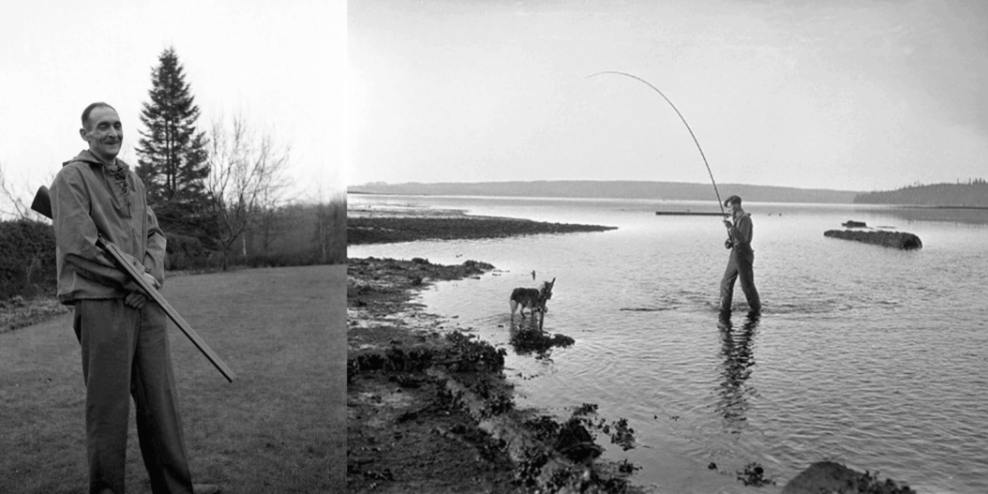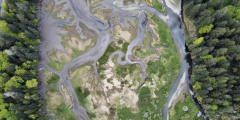Roderick Haig-Brown was many things – hunter, fly fisherman, judge, University of Victoria chancellor, and a prolific author. But most of all, he was a conservationist who thought deeply about our relationship with nature in a way that was far ahead of his time. Haig-Brown may also be one of Campbell River’s most underappreciated citizens.
Born in Sussex, England, in 1908, Haig-Brown spent his teen years learning to fish and shoot with family friends and gamekeepers who worked on the estates of wealthy English gentry. His dad Alan was killed in World War I.
In 1921 he enrolled at Charterhouse School, but the restless lad was expelled for drinking and sneaking out. Afterwards, he joined his late father’s military regiment. However, strict army life didn’t suit him.
The family urged him into civil service, but instead, he accepted an uncle’s invitation to visit him in Seattle.
After arriving in the Pacific Northwest, the young Haig-Brown toiled at a Washington State logging camp then headed north to Vancouver Island. The tall trees, clear streams and bountiful ocean mesmerized him. He logged, crewed on commercial fishing boats and at times guided visiting anglers.
A return to England was brief – the call of the Canadian wilds pulled him back. He married a Seattle gal Ann Elmore, and in 1936 they settled on the banks of the Campbell River, where they would raise four kids. Together, they built a small farm with a cow for milk, goats and a large garden. It was the ideal river property for an avid angler.
By then, he was working on his third book, Panther. He would go on to publish 25 books, including classics like Western Angler, A River Never Sleeps, and Measure of the Year, as well more than 200 essays and speeches.
Time spent logging and fishing gave Haig-Brown a profound respect for nature and made him keenly aware of humans’ capacity for ecological destruction and greed. Though he was a lifelong hunter and fisherman, Haig-Brown preached respect over ego-driven limit bagging. For Haig-Brown, time spent on a river was one of the most rewarding experiences in life, whether he hooked a fish or not.
“Moving water… has a fascinating vitality. It has power and grace, and associations. It has a thousand colors and a thousand shapes, yet it follows laws so definite that the tiniest streamlet is an exact replica of a great river,” he wrote.
Haig-Brown could be as critical as he was eloquent. For example, in a 1965 speech to the BC Author’s Association at Victoria’s Empress Hotel, he expressed contempt for the then Social Credit government.
“The shoddy, uncaring development of our natural resources, the chamber of commerce mentality which favors short-term material gain over all other consideration, the utter contempt for human values of every kind,” Haig-Brown said.
He went on to accuse politicians of possessing a “trivial provincial mentality” that sought “petty advantage at cost to the common wealth.”
But the most “unnerving” thing about his speech, noted writer Andrew Nikiforuk in a 2016 profile of Haig-Brown published in The Tyee, is its relevance more than 50 years later.
Haig-Brown called himself a lifelong conservationist, something he considered a duty, not a choice.
“It seems clear beyond possibility of argument that any given generation of men can have only a lease, not ownership, of the earth; and one essential term of the lease is that the earth be handed down on to the next generation with unimpaired potentialities. This is the conservationist’s concern.”
Some people are gifted with the ability to see through time. Haig-Brown was one of them. He pondered resource management, fish and trees, in an era when most loggers, fishermen and politicians treated them as though they were infinite and inexhaustible.
In 1974, the Haig-Browns sold their home and property on the banks of the Campbell River to the BC government. It was preserved as a greenbelt.
Haig-Brown died in 1976 at the age of 68. The old family home lives on as Haig-Brown Heritage House with a writer-in-residence program and bed and breakfast.










